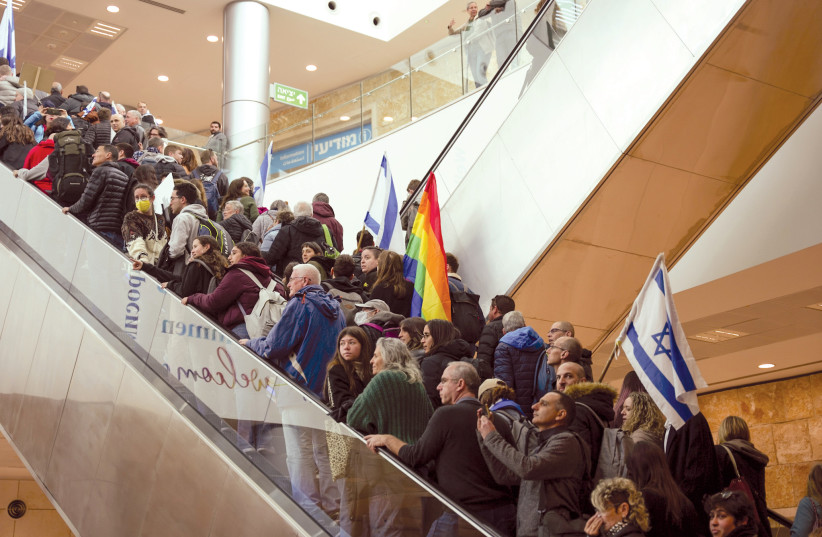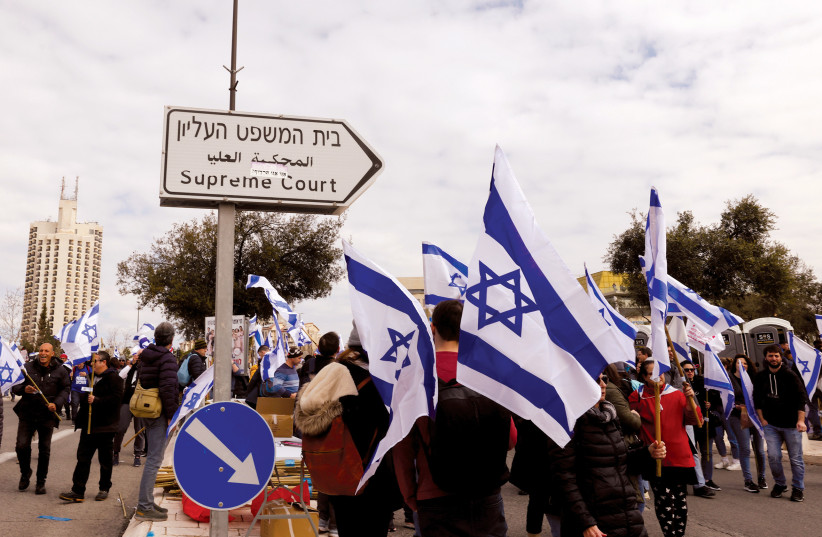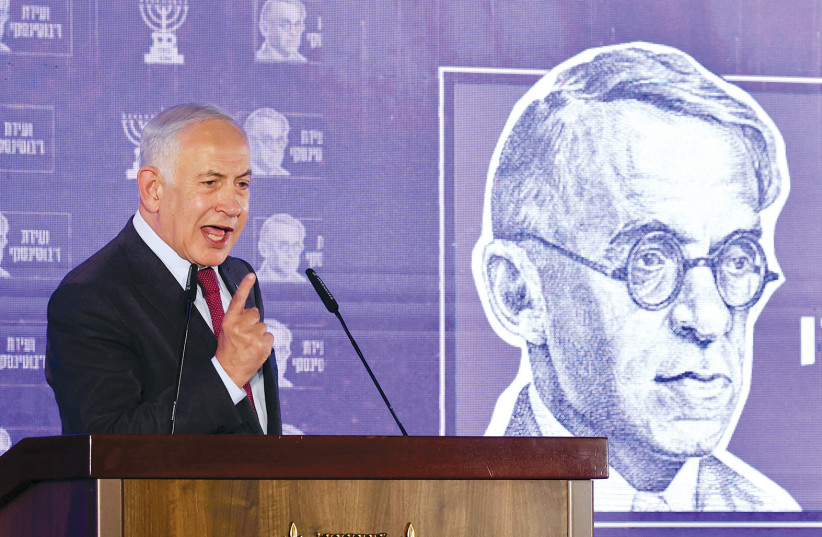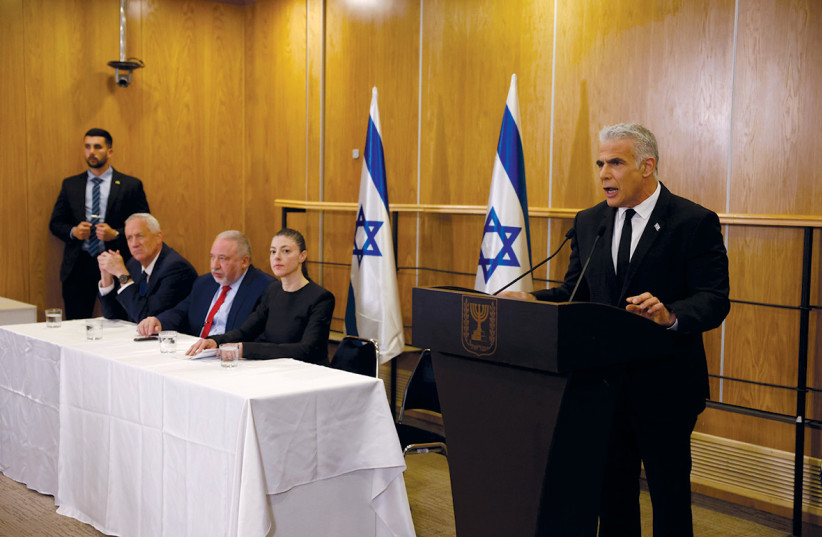What do Jerusalemites think about Israel's judicial reform, protests?

In Jerusalem asked around the city to see what Israelis think about judicial reform and the massive protests.
Well over 80,000 Israelis swarmed Jerusalem this past Monday, converging on the Knesset to voice their thoughts on the Israeli government’s planned judicial reforms.
This is an important issue that has dominated the headlines ever since the new government was sworn in, but this particular protest (which some counted as numbering closer to 100,000) also caused significant public transportation issues due to limited and crowded buses, trains and light rails, as well as street closures.
But what does the average person on the streets of Israel’s capital think about all this?
To find out, In Jerusalem asked around the city and took a trip to the bustling alleyways of Jerusalem’s Mahaneh Yehuda market to see what people think about judicial reform and massive protests.
Despite the sheer number of protesters in a politically charged atmosphere, the marketplace was as bustling as ever.
Anti-judicial reform sentiments in the marketplace
Right away, some anti-reform sentiments were evident.
“The time has come!” one shopkeeper declared, welcoming the protests.
“Israel must be a democracy, and it must be that way in the court, the government and everywhere else.”
In spite of being so passionate about his views, the shopkeeper refused to go to the protest. “Why don’t I go to the protest? Because I have to work,” he explained, noting that “this country is only a democracy for those with enough money.”
One group of American tourists also expressed their opposition to judicial reform.
“If they go through with it, they’re going to have a real problem with American Jews,” one of them said. However, she noted that the resulting public transportation issues didn’t bother her. “None of it’s bothered me today. I haven’t come across any issues where I am so far.”
The reform does have its supporters, with many citing a number of issues in a judicial system that they see as too powerful. However, the attitude on the streets was largely one of opposition.
What do people think about the judicial reform itself?
“I don’t believe for a second that this round of suggested policies is an honest attempt to restore checks and balances,” one opinionated and informed Jerusalemite said, adding that as far as he could tell, it mainly serves to “help criminals keep their jobs.”
But he also described it as an attempt to go against any possibility for dialogue and “pick the most extreme option under a false pretext that it’s the only way. They replace a sub-optimal balance with an absolute knock-out to the judicial branch.”
He concluded by noting what is at stake for some of the members of the coalition, with several members having a history of legal woes or even ongoing trials. “It’s clear that they’re taking advantage of legitimate frustrations and sentiment to save their own seats.”
Some others expressed support for both the reform and of Prime Minister Benjamin Netanyahu, who historically has been popular in the Mahaneh Yehuda market.
“Everything will all work out in the end,” one shopkeeper said. “This is still the government of Benjamin Netanyahu.”
However, this opinion wasn’t universal.
“Netanyahu? A leftist!” another vendor said. “He’s a puppet dancing for the coalition.”
But also present at the marketplace that day were protesters, gathering there before heading off to the Knesset or Supreme Court.
“The judicial reform isn’t good,” one veteran protester from Tel Aviv stated. “If there are problems, don’t just throw everything out. You need to fix them.”
“Which side am I on? This side,” one protester said while hoisting an Israeli flag.
“I’m a Jerusalemite, though I now live in Jaffa and I grew up in a Likud family, a revisionist family raised on Ze’ev Jabotinsky,” he said. “What’s happening today in the Knesset goes against what the Likud used to be.”
He continued: “There are security issues, an economic crisis. What they’re dealing with now isn’t their first priority.”
This protester also refused to call it a judicial reform but a revolution.
“It’s not a reform, it’s a revolution,” he said. “A reform comes to fix things. This has come to ruin it.”
As a born-and-raised Jerusalemite, he expressed his sympathies for the transportation issues but doubled down on its necessity.
“Protests aren’t comfortable,” he said.
Protests cause public transportation issues, causing problems for some in Jerusalem
BUT OTHERS bemoaned just how much the protests are interfering with their day-to-day life trying to get to work. One bat sherut (National Service worker) expressed as much after a difficult commute to work from her nearby National Service apartment.
“The bus stops were busier, and you could tell people were getting a little pushier, possibly because several buses were canceled and extremely delayed,” she explained.
“The real challenge will be commuting back tonight. I expect the light rails will get even more crowded, something a busy bat sherut does not have time for.”
And she wasn’t alone.
“I left the house around 9 a.m. but I got to work at around 12,” related one woman who commutes to Jerusalem from Tel Aviv every day for work. “What should have been one and a half hours took three. I tried to get on multiple trains, but they were all full. People had to be transferred to other trains because they were so packed. People weren’t able to get off at stops before Jerusalem.”
Despite this, the commuter said that she fully supported the protests and said the atmosphere on the trains was pleasant. “Everyone seemed happy,” she added. “There was a good vibe on the train.”
But what was it like at the protest itself?
Those gathering at the Knesset would have witnessed a huge mass of demonstrators all voraciously voicing their opposition against the judicial reform, bringing many sectors of Israeli society together.
According to one religious Jewish woman at the protest, this was something every Israeli needed to do.
“I think every citizen should be here today,” she said. “It doesn’t seem like a special act to come here. It seems like the most natural thing to do today is to be here. We’re very concerned about our state. We live here, we were born here, we raised our kids here, and we have a son in the army. We’re very, very concerned for democracy, for equality, for the liberty of the judiciary, and we need to be here.”
There was support for the reforms at the Knesset too, though.
A group of Jerusalem yeshiva students came to the protest and spoke to those who approached them about why they supported the government and its efforts concerning the judicial system.
While some of the people who approached the teenage students yelled at them and even shoved flags in their faces, the students responded by calmly explaining their position and even agreeing on some points with those arguing with them.
This dispute, as well as the colorful and pluralistic nature of the protest itself, is reflective of the rich diversity within Israeli society, as well as how everyone has an opinion on the reforms.
“It’s so incredible to be out there with a crowd that is just so diverse,” one protester said. “You’ve got kids who are 12, you’ve got people who are 90, you’ve got everyone on the religious spectrum out there with you. It’s incredible that you can unite with people you’d never expect to be protesting with. I could be standing next to a hardcore right-wing Israeli because we both believe this reform is bad for Israel’s democracy and we both care about and love Israel and are there for that, even if we have nothing in common.”
She concluded: “I guess what I love about protesting the reform in Jerusalem is the diversity of the other people out there with you. There are religious, secular, left-wing, right-wing. But they’re all united in a shared love of this country.” ❖
Tzvi Joffre contributed to this report.
Jerusalem Post Store
`; document.getElementById("linkPremium").innerHTML = cont; var divWithLink = document.getElementById("premium-link"); if (divWithLink !== null && divWithLink !== 'undefined') { divWithLink.style.border = "solid 1px #cb0f3e"; divWithLink.style.textAlign = "center"; divWithLink.style.marginBottom = "15px"; divWithLink.style.marginTop = "15px"; divWithLink.style.width = "100%"; divWithLink.style.backgroundColor = "#122952"; divWithLink.style.color = "#ffffff"; divWithLink.style.lineHeight = "1.5"; } } (function (v, i) { });




